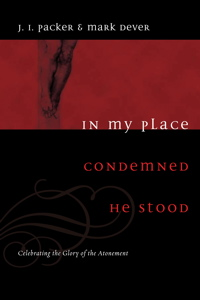 As we have just come through the Easter season, it was good for me to spend time considering the cross upon which our Savior bled and the accomplishments upon that cross. J.I. Packer and Mark Dever have done a great job defining and explaining Penal Substitution in their fine book In My Place Condemned He Stood By and large, this is a work made up of the former works of Dever and Packer. Only the foreward, the preface, the introduction and the epilogue and the annotated bibliography by Ligon Duncan are unique to this book, but the chapters offered by Packer and Dever from their previous works are worthy of re-reading (if you have already read them) and/or of familiarizing yourself with them immediately.
As we have just come through the Easter season, it was good for me to spend time considering the cross upon which our Savior bled and the accomplishments upon that cross. J.I. Packer and Mark Dever have done a great job defining and explaining Penal Substitution in their fine book In My Place Condemned He Stood By and large, this is a work made up of the former works of Dever and Packer. Only the foreward, the preface, the introduction and the epilogue and the annotated bibliography by Ligon Duncan are unique to this book, but the chapters offered by Packer and Dever from their previous works are worthy of re-reading (if you have already read them) and/or of familiarizing yourself with them immediately.
To be honest, even without the plethora of information and fine writing in the body of the book, this book would be worth the price to own the annotated bibliography and section on Books on the Cross of Christ, by Duncan. If you are looking for books on the cross and especially on the doctrine of the atonement and penal substitution, start with this one and then use the footnotes and Ligon Duncan’s guide to further build your library.
Packer and Dever point out in this book that the cross of Christ was indeed the place of punishment for our Savior, but it was not some form of divine child-abuse, rather it was the willing act of an obedient and divine Son to honor his Father by bringing about the salvation of his creation. On the cross Christ was the propitiation for our sins and Packer points out that:
A gospel without propitiation at its heart is another gospel than that which paul preached. The implicaitons of this must not be evaded…The difference is that expiation means only half of what propitiation means. Expiation is an action that has sin as its object; it denotes the covering, putting away, or rubbing out of sin so tha tit no longer constitutes a barrier to friendly fellowship between man and God. Propitiation, however, in the Bible, denotes all that expiation means, and the pacifying of the wrath of God thereby.
Without the doctrine of penal substitution, there truly is no gospel and there is no salvation, for God’s justice must be satisfied, and only the doctrine of penal substitution adequately explains both man’s sinfulness and God’s holy righteousness in punishing that sin.

